Vantage Point
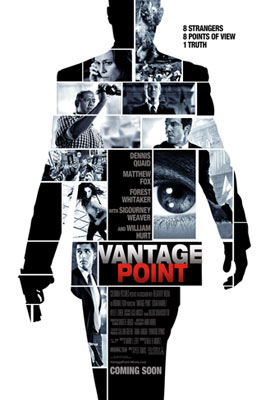
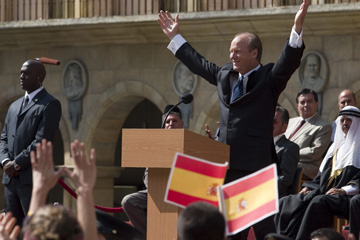 The film's central premise take place during a nearly half-hour time frame. This is the amount of time covered when the President of the United States (William Hurt) arrives at a public summit and rally in Spain, takes the podium to begin to give his speech, and then is shot down by an assassin's bullet. The chaos that erupts is only heightened when two bombs (one off in the distance, the other right in the square where the President was) go off, killing and injuring hundreds more. Once this scene has run its course, the movie literally rewinds itself, and starts over again from the beginning, only this time showing it from a different perspective. We get multiple perspectives of different people who were there at the event. The first view we get is hard-nosed network news producer, Rex Brooks (Sigourney Weaver). Then we see things through the eyes of Secret Service Agent, Thomas Barnes (Dennis Quaid), whose hunt for the truth of what happened is constantly haunted by his own past. We eventually also get the views of a tourist named Howard Lewis (Forest Whitaker), who just happened to catch something on his handheld camera that might hold some answers, a shady person in the crowd named Javier (Edgar Ramirez), and even the view of the President himself. Each of these people saw something different either in the events leading up to the chaos, or right before it happened. The story slowly reveals itself each time we watch the events through different eyes, and we're supposed to follow all of their stories to the ultimate conclusion of what really happened.
The film's central premise take place during a nearly half-hour time frame. This is the amount of time covered when the President of the United States (William Hurt) arrives at a public summit and rally in Spain, takes the podium to begin to give his speech, and then is shot down by an assassin's bullet. The chaos that erupts is only heightened when two bombs (one off in the distance, the other right in the square where the President was) go off, killing and injuring hundreds more. Once this scene has run its course, the movie literally rewinds itself, and starts over again from the beginning, only this time showing it from a different perspective. We get multiple perspectives of different people who were there at the event. The first view we get is hard-nosed network news producer, Rex Brooks (Sigourney Weaver). Then we see things through the eyes of Secret Service Agent, Thomas Barnes (Dennis Quaid), whose hunt for the truth of what happened is constantly haunted by his own past. We eventually also get the views of a tourist named Howard Lewis (Forest Whitaker), who just happened to catch something on his handheld camera that might hold some answers, a shady person in the crowd named Javier (Edgar Ramirez), and even the view of the President himself. Each of these people saw something different either in the events leading up to the chaos, or right before it happened. The story slowly reveals itself each time we watch the events through different eyes, and we're supposed to follow all of their stories to the ultimate conclusion of what really happened.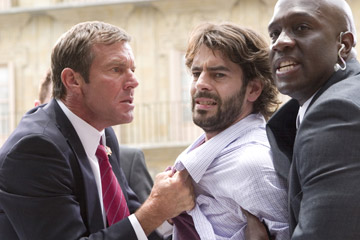 To its credit, Vantage Point is certainly never boring, and keeps things moving at a pace that never once slows down during its tense and quick 90 minute run time. The opening 10 minutes or so that depicts the event in question is some of the most attention-grabbing stuff I've seen in a movie in a while. Director Pete Travis does a great job of showing the carnage and aftermath of the event, despite the film's PG-13 rating. It's terrifying, gritty, and makes us simultaneously intrigued and frightened at the same time. When the film's central gimmick of rewinding time and showing the same event from a different point of view initially starts to play itself out, I was even further intrigued, and found myself getting excited that I had stumbled upon a rare early-year release gem. Although it took a while, that excitement generally began to fade. The movie eventually begins to abandon its own premise, giving us a final 20 minutes or so that doesn't focus on anybody, and just gives us a standard action movie conclusion with plenty of shoot outs, double crosses, and car chases that are shot well, but don't really offer anything new to the long-standing tradition of car chase scenes. I wondered to myself why screenwriter Barry Levy didn't believe enough in his own idea to carry it through all the way. He does such a great job of balancing multiple storylines, characters, and scenarios without making things confusing, that I felt a bit saddened that he threw it all away for a conventional Hollywood ending. Was it studio pressure, perhaps? Whatever the case, the movie never quite lives up to the promise it gives itself.
To its credit, Vantage Point is certainly never boring, and keeps things moving at a pace that never once slows down during its tense and quick 90 minute run time. The opening 10 minutes or so that depicts the event in question is some of the most attention-grabbing stuff I've seen in a movie in a while. Director Pete Travis does a great job of showing the carnage and aftermath of the event, despite the film's PG-13 rating. It's terrifying, gritty, and makes us simultaneously intrigued and frightened at the same time. When the film's central gimmick of rewinding time and showing the same event from a different point of view initially starts to play itself out, I was even further intrigued, and found myself getting excited that I had stumbled upon a rare early-year release gem. Although it took a while, that excitement generally began to fade. The movie eventually begins to abandon its own premise, giving us a final 20 minutes or so that doesn't focus on anybody, and just gives us a standard action movie conclusion with plenty of shoot outs, double crosses, and car chases that are shot well, but don't really offer anything new to the long-standing tradition of car chase scenes. I wondered to myself why screenwriter Barry Levy didn't believe enough in his own idea to carry it through all the way. He does such a great job of balancing multiple storylines, characters, and scenarios without making things confusing, that I felt a bit saddened that he threw it all away for a conventional Hollywood ending. Was it studio pressure, perhaps? Whatever the case, the movie never quite lives up to the promise it gives itself.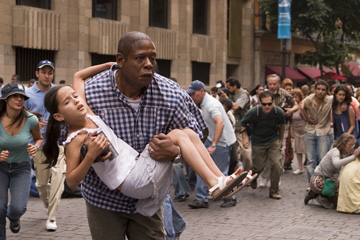 The true glaring flaw of the film does not reveal itself until about halfway through. That's when we start to realize that the movie is never giving us anything to figure out for ourselves. There is no mystery in Vantage Point, no clues it gives us so that we can try to follow the information to the ending. The movie keeps everything hidden from us, only to reveal it later on for us. During one of the early scenarios, Secret Service Agent Thomas Barnes runs inside the news van on the scene, asking to look at their live tapes of the attack. He sees something on one of the tapes that makes his face go white with fright, and when he orders the news crew to freeze the tape, we don't get to see what he's looking at. He just runs out of the news van, and we don't hear from him or find out what he saw until the movie is good and ready to explain everything to us during one of the film's later scenarios. It keeps on hiding things from us, only go explain everything away later on. This approach gives us nothing to work with, so we eventually start to feel like outsiders, instead of truly being involved in the story in some way. Another flaw that eventually comes to light is that in covering the same event over and over, a lot of the tension is eventually lost. It never becomes dull or repetitive, since we're looking at it through fresh eyes, but I eventually found that I just wasn't as excited as I initially was about finding out what happened as the film started to rewind itself each time.
The true glaring flaw of the film does not reveal itself until about halfway through. That's when we start to realize that the movie is never giving us anything to figure out for ourselves. There is no mystery in Vantage Point, no clues it gives us so that we can try to follow the information to the ending. The movie keeps everything hidden from us, only to reveal it later on for us. During one of the early scenarios, Secret Service Agent Thomas Barnes runs inside the news van on the scene, asking to look at their live tapes of the attack. He sees something on one of the tapes that makes his face go white with fright, and when he orders the news crew to freeze the tape, we don't get to see what he's looking at. He just runs out of the news van, and we don't hear from him or find out what he saw until the movie is good and ready to explain everything to us during one of the film's later scenarios. It keeps on hiding things from us, only go explain everything away later on. This approach gives us nothing to work with, so we eventually start to feel like outsiders, instead of truly being involved in the story in some way. Another flaw that eventually comes to light is that in covering the same event over and over, a lot of the tension is eventually lost. It never becomes dull or repetitive, since we're looking at it through fresh eyes, but I eventually found that I just wasn't as excited as I initially was about finding out what happened as the film started to rewind itself each time.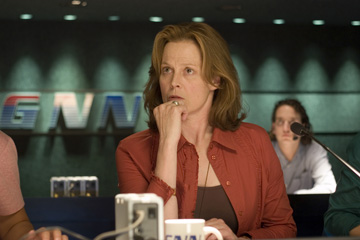 The gimmick of Vantage Point that allows us to see things through the eyes of different characters pretty much ensures that there is no one lead character. Some characters do get more attention than others, though. Dennis Quaid's Thomas Barnes character has the most fleshed out backstory, as we learn why this is his first time on duty with the President in almost a year. The fact that he becomes one of the main central focuses during the film's final half when it ditches its own concept makes him probably the closest thing this movie has to a "hero" that the audience is supposed to identify with. The rest of the characters are given either no background or story at all, or very limited information given about them in their dialogue. The only other character who truly stands out beside Quaid is Forest Whitaker's character is probably the most human, in that he's the only one in the film who finds himself trapped in the chaos that comes across as frightened for his own life, while at the same time wanting to do the right thing. The other performances seem to be mainly there for a pay check, especially Sigourney Weaver as the news producer, whose part is so small you wonder why she bothered to show up in the first place. Even William Hurt as the President doesn't get to play as large of a role as we hoped when we eventually get to learn the truth about his side of the story. Though the performances are never bad, they are often given little to do, aside from the previously noted exceptions.
The gimmick of Vantage Point that allows us to see things through the eyes of different characters pretty much ensures that there is no one lead character. Some characters do get more attention than others, though. Dennis Quaid's Thomas Barnes character has the most fleshed out backstory, as we learn why this is his first time on duty with the President in almost a year. The fact that he becomes one of the main central focuses during the film's final half when it ditches its own concept makes him probably the closest thing this movie has to a "hero" that the audience is supposed to identify with. The rest of the characters are given either no background or story at all, or very limited information given about them in their dialogue. The only other character who truly stands out beside Quaid is Forest Whitaker's character is probably the most human, in that he's the only one in the film who finds himself trapped in the chaos that comes across as frightened for his own life, while at the same time wanting to do the right thing. The other performances seem to be mainly there for a pay check, especially Sigourney Weaver as the news producer, whose part is so small you wonder why she bothered to show up in the first place. Even William Hurt as the President doesn't get to play as large of a role as we hoped when we eventually get to learn the truth about his side of the story. Though the performances are never bad, they are often given little to do, aside from the previously noted exceptions.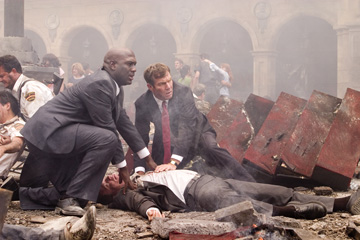
See the movie times in your area or buy the DVD at Amazon.com!






0 Comments:
Post a Comment
<< Home